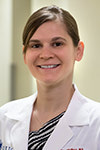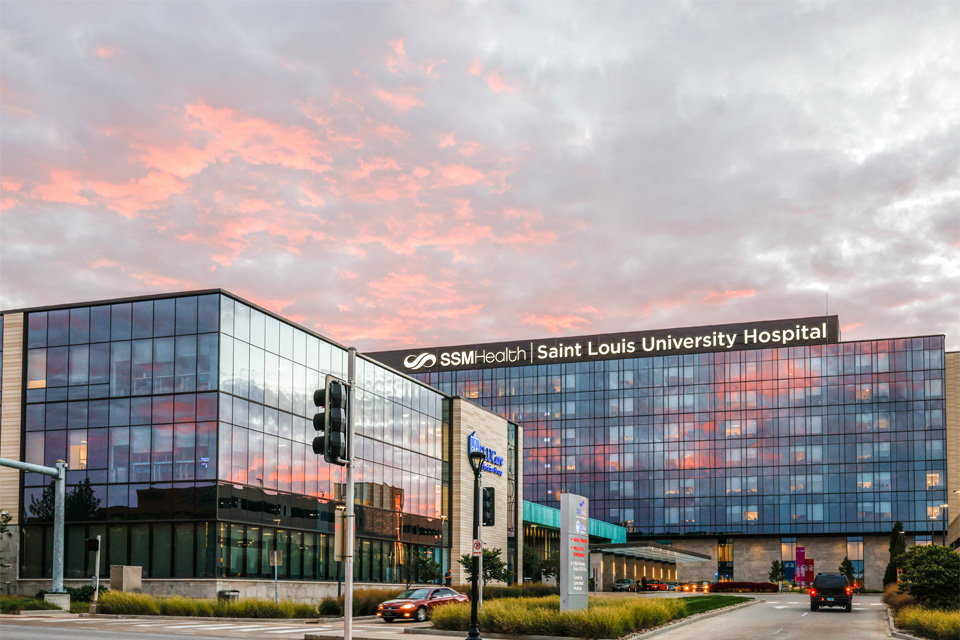Cardiovascular Fellowships
The Saint Louis University Division of Cardiology enjoys a rich tradition in training future cardiologists.
For over 30 years, the division's faculty has dedicated significant time and energy toward the SLU cardiology fellowship program. We take great pride in our training program, emphasizing clinical cardiology. Two training programs are offered — a three-year cardiovascular fellowship and a one-year interventional cardiology fellowship.
Welcome From Our Program Director
Welcome to the SSM Health/Saint Louis Univeristy School of Medicine Cardiovascular Medicine Fellowship Program in St. Louis. Our three-year ACGME-accredited cardiovascular training program is registered with the National Resident Match Program. The program is crafted to fulfill general cardiovascular training requirements while supporting individualized goals to prepare trainees for their careers or advanced fellowships. Each year, our program committee selects highly qualified fellows whom we nurture into confident and capable cardiologists.
Fellows in our program take advantage of two training sites: Saint Louis University Hospital and the John Cochran Veterans Administration Medical Center. Here, we serve a diverse patient population with a high acuity and wide range of pathology. Fellows are exposed to contemporary cardiac advances in both noninvasive/imaging and invasive/structural cardiology through daily patient care and also through many clinical trials. For more information about the clinical and academic opportunities available to our fellows during their training, please refer to our program overview.
At Saint Louis University, we are committed to fostering a culture of excellence and providing our fellows with the skills and knowledge necessary to succeed in their future careers. All of our fellows have the opportunity to achieve ACC Core Cardiology Training Symposium (COCATS) Level II coronary angiography, echocardiography and nuclear cardiology while engaging in a wide range of clinical and research experiences. With a comprehensive didactic curriculum, bedside teaching, and dedicated faculty, we provide a supportive environment for fellows to thrive.
Thank you for your interest in our program. Feel free to contact us with questions regarding our program or the application process.

Sincerely,
Deana Mikhalkova, M.D.
Program Director
Cardiovascular Medicine Fellowship
Cardiovascular Fellowship
SSM Health/SLU's three-year cardiovascular fellowship training program recruits four new fellows per year. All four spots are routinely selected using the match process through the National Residency Matching Program (NRMP).
The program has maintained full Accreditation Council for Graduate Medical Education (ACGME) accreditation without interruption since the last site visit in 2011.
Within the three-year fellowship program, our fellows are all eligible for American Board of Internal Medicine (ABIM) cardiovascular disease board certification. Many are also eligible for advanced certification in echocardiography through the National Board of Echocardiography and nuclear medicine through the Certification Board of Nuclear Cardiology.
Structure
The program focuses on inpatient training at SSM Health Saint Louis University Hospital and the VA Saint Louis Health Care System - John Cochran Division. Outpatient experiences are also obtained at multiple sites within the St. Louis region.
Training takes place in two distinct phases. The first 24 months are dedicated to providing level I exposure to all elements of cardiology. The last 12 months are set aside to achieve level II procedural expertise in some focused areas of cardiology. The overall length of experiences is dictated by the American College of Cardiology Training Task Force COCATS document.
Specifically, the first two years include:
- Four months: Cardiac cath lab
- Seven months: Noninvasive imaging labs
- Nine months: Inpatient and consultation services
- Two months: Electrophysiology
There are prescribed research months in the first and second years of training. The trainee and the program director determine the exact structure of the third year based on specific needs for future practice. For example, trainees interested in pursuing interventional cardiology training may elect to perform more months of catheterization within the third year. In contrast, trainees who want to achieve a higher level of certification in echocardiography spend more time in the noninvasive laboratories.
Conferences and Teaching
The training program maintains a robust noon conference didactic program on an 8-12 month cycle that covers all basic and some advanced cardiovascular concepts relevant to all aspects of cardiology.
July and August are reserved for the basic review of core concepts, with lectures during that time principally given by the faculty. There is then a nine-month period, which includes one hour per week dedicated to electrophysiology, clinical case conferences, noninvasive imaging, and catheterization conferences.
There is also a journal club curriculum where the key aspects of scientific review of the medical literature are covered. Visiting professors frequently interact with the division and fellows to supplement the didactic educational program.
The program uses the American College of Cardiology In-Training Examination administered every fall to monitor trainees’ knowledge base and target areas of weakness, programmatic and individual standpoint.
Research
All fellows are expected to participate in clinical research throughout their three years. We have multiple ongoing multicenter clinical trials that allow fellows to receive valuable experience in patient recruitment and upcoming therapies not yet available.
Individual clinical research projects are also ongoing in the cath lab, electrophysiology and heart failure fields that provide trainees the opportunity to be successful in designing, conducting, analyzing and presenting a research project. Fellows are encouraged to submit their research for potential presentation at national and regional meetings.
Interventional Cardiology Fellowship
The one-year interventional cardiology fellowship program at SSM Health/Saint Louis University School of Medicine is for physicians who have already completed internal medicine and general cardiology training. Requirements include board certification in internal medicine and completion of at least three years of cardiology fellowship training, including cardiac catheterization and coronary angiography certification.
One fellow is accepted each academic year. The fellow’s responsibilities include evaluating and caring for patients referred for cardiac catheterization and undergoing interventional procedures, and performing those procedures with the attending interventional cardiologists.
Affiliated hospitals include SSM Health Saint Louis University Hospital and VA Saint Louis Health Care System - John Cochran Division. Upon completing the training, our fellows will be qualified to perform coronary and peripheral interventions and be board-eligible for the certifying examination from the American Board of Internal Medicine, Interventional Cardiology.
Fellows are involved in over 350 coronary procedures per year. These include acute MI, cardiogenic shock cases, Impella implantation and management, and complex coronary interventions, including exposure to advanced chronic total occlusion lesion techniques. The fellow will participate in over 100 peripheral interventions, including renal, iliac and lower-extremity angioplasty procedures. This training includes exposure to radial access to peripheral procedures and C02 angiography. The fellow also participates in ongoing clinical trials in the cardiac catheterization labs and has the opportunity to perform independent research with sponsored travel to national meetings.
Fellows are selected through the National Residency Matching Program (NRMP).
Applications are accepted only through the Electronic Residency Application System (ERAS).
Fellowship interviews are held in September and October.
Note: Only U.S. Citizens/permanent residents and J-1 visas sponsored by the ECFMG are considered for clinical training. We do not accept HI-B visas or applicants with "pending permanent residency" status. If an applicant is a J-1 visa holder, the applicant must have adequate time to complete the fellowship before losing J-1 status (three-year total).
